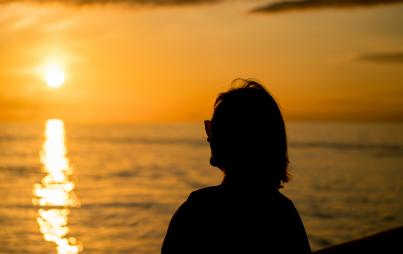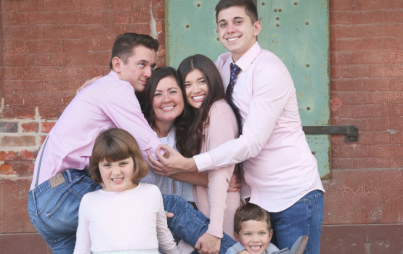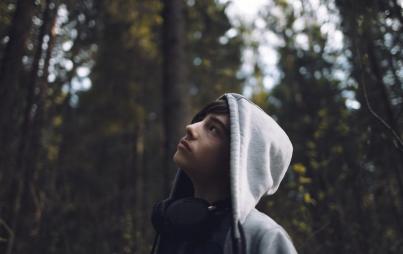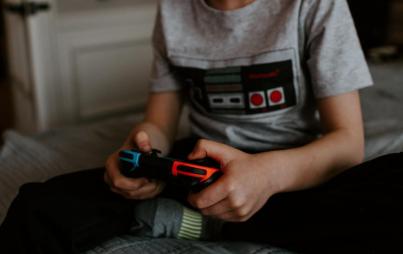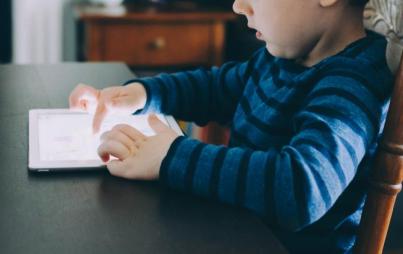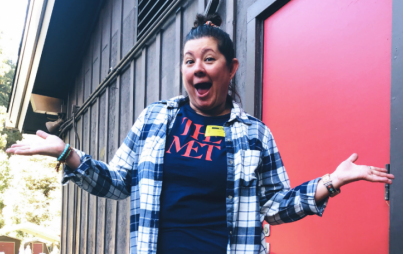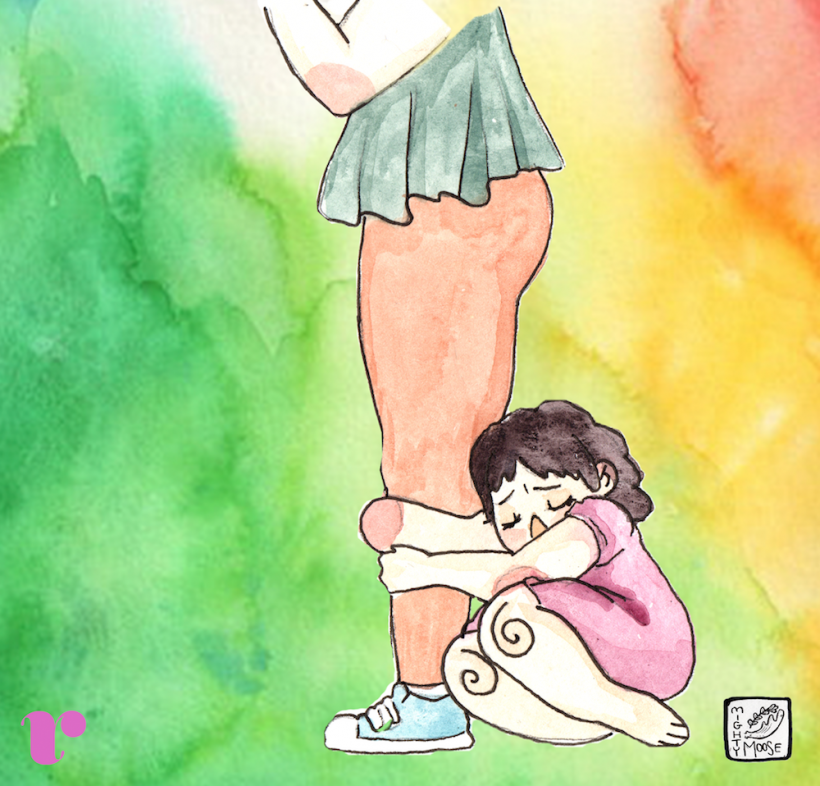
image credit: Mariah Aro Sharp @mightymooseart
My childhood report cards are on fading pink sheets of a carbon copy. In the early 80s, before computers were a thing and typewriters were hard to use and didn’t have a way to be corrected, people wrote everything. Back then, report cards included thoughtful notes in cursive, written in pen and copied through several layers — white for the office, yellow for the teachers, pink for my box of memorabilia.
My grades aren’t remarkable — consistently As, a very rare B in math. What is remarkable though, is the comment section. Almost every one of those pink papers (which have since been recycled) has notes well into the margins — written with the fanciful loops of letters I didn’t recognize then and barely do now, scrolling up the sides, sometimes with additional notes stapled to them.
They all have some version of the same sentiment.
Joni is incredibly bright.
Joni is one of the most intelligent children I’ve ever had the pleasure of teaching.
Joni is so helpful in class and with her peers.
Joni is a delight.
Joni is a treasure.
And while that all looks like I’m saying I was some kind of prodigal angel-genius, what you’re missing is the rest of the story.
…but I’m really concerned about her.
…but I think she would benefit from a visit with our psychologist.
…but her helping seems almost co-dependent.
…but I’m worried.
…but can you come in so we can meet with the principal and talk about how she’s doing aside from academics?
I started kindergarten in a neighborhood where kids stole my milk money every day. I was a tiny, awkward girl in a school full of kids whose lives were more obviously complicated than mine. I had food and clothes. My hair was cute. I was dressed nicely. I was an easy target for those kids, and in hindsight, they probably needed the milk money anyway.
I started at that kindergarten because when my mom left my dad in the previous June, she took me to my grandparent's house in the desert, where I spent the summer being devoured by mosquitos and watching my 15-year-old uncle catch scorpions in coffee cans. When the summer was over, I came home, and my mom and dad were divorced. We lived in a new house. I had a new stepfather who drove a tanker truck for a living and used to offload gas into our backyard, which I’m pretty sure is both illegal and incredibly dangerous.
His name was Bill. I’d never seen him before I was living in his house. Bill was the reason I ended up getting my milk money stolen. He smelled like gas and beer and cigarettes. He had a daughter that used to lick her plate when she was done eating, which is all I remember about her. The whole situation was pretty awful.
By the second month of kindergarten, my mom and Bill were divorced. Their marriage ended in a tornado of broken beer bottles and shattered dishes, while I stood outside the house with our neighbor, a nice lady with twin boys who probably thought my mother was a lunatic. We moved out of Bill’s house and into an apartment, and I transferred to a new school where no one took my milk money.
My mom spent the next year or so alternating between mania and drunkenness. I spent the next year acting like a kid whose mother was either manic or drunk.
When I was six, my mom was hit head on by a drunk driver, which is tragic, but also ironic. She was supposed to be driving her MGB convertible, but it wouldn’t start, so she borrowed an old Chevy truck from a farmer who frequented her favorite bar. After the jaws of life pulled her from the wreckage, the paramedics saved her life. Her face was shattered and the bones in her legs weren’t in her legs anymore. Instead, they were sticking out at angles that bones aren’t supposed to. She was in the hospital for three months.
Because she was driving the Chevy truck instead of her tin can car, she lived through what would have certainly killed her. So, I guess, she should have died, but she didn’t. That was a miracle from God. We went to church to thank him.
She was sober after that, for a little while.
I spent the three months my mom was in traction living with my great-grandmother and accruing more report card notes. My teachers hugged me and let me visit with them after class. They let me erase the blackboard and stay in at recess reading instead of playing.
I don’t remember more than two or three of the teachers I had in college. A few of my high school teachers stick out as particularly influential. But I can tell you the name of every teacher I had from the time I was five until I was 14.
Miss Flippo. Mrs. Dibble. Mrs. Welch. Mrs. Edwards. Mrs. Shoemaker. Mrs. Taylor. And so on.
Mrs. Edwards passed my humiliating school photo around the class because she was a horrible person who would profess her love to me and then tell me I was too short to do anything on the blackboard. Anyway, the rest of them were my lifelines.
People who knew my mother and know how I am now often remark that I’m a “miracle,” or whatever. I’m not a miracle by any means. I was successful in school because I was born smart and with an unusually good memory. I made sure that the parts of my life I could control were very orderly because my mom was drunk, and when your mom is drunk, nothing is in order. I worked very hard because I didn’t want to fail because my mom left my dad, and then my dad left me, and kids who are really good at school and life and everything (I thought) didn’t get left.
I kept doing that, well, forever, because even after hundreds of hours of therapy, I still think people are going to leave. Even though no one has, once your parents leave you, I think you’ll always be afraid everyone else will, too.
I wouldn’t have classified myself as having “special needs.” There were whole classes at the back of the school with dedicated, specially trained teachers for that. But I see now that I had needs that impacted the way I saw and felt everything around me.
I had a father 2,000 miles away and a mother with whom “quality time” meant me hanging out on a barstool drinking Shirley Temples with extra cherries until I was sick from cherries but had perfected the skill of tying a knot in the stem using just my tongue. I wasn’t normal, but the fact that my life wasn’t normal wasn’t apparent to me.
You might also like: 10 Things The Adult Child Of An Addict Wants You To Know
Don’t most kids feel afraid to come home? Aren’t most kids worried if there will be dinner and drinks, or just drinks and more drinks? Don’t most kids fall asleep to the sounds of their mother screaming and throwing things at men they don’t know?
I wasn’t a “special needs” child in the way that kids with Autism need one-on-one instruction or in the way that a hard-of-hearing child needs someone to interpret for them. I was a kind of special that no one could see, which could, even should, have made it easy to ignore. But I was lucky enough to have a handful of teachers who could, and would, give hugs. They gave me things to do and ways to help and tiny tasks that I could control without being controlled by them. These women were the mothers of my childhood, there for me in a time that I would have otherwise been alone.
It’s not a miracle I turned out as I did, it took a lot of people to raise me.



